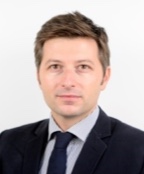Acoustic schwannomas (also known as acoustic neuromas or vestibular schwannomas) are a relatively rare non-cancerous tumour that arises from the vestibulocochlear nerve. These tumours grow slowly due to the over proliferation of Schwann cells, which normally wrap around nerves to provide support and insulation. Most commonly, patients present with hearing loss, sensation of fullness in the ear or ringing in the ears. In addition, the vestibulocochlear nerve runs through the cerebellopontine angle alongside important cranial nerves, blood vessels and the brainstem. Large tumours can compress these nearby structures and cause additional symptoms, such as facial paralysis and balance problems or unsteadiness. Once the preliminary diagnostic procedures including hearing tests (audiometry) and computed tomography (CT) scans are completed, the gold standard for diagnosis of acoustic schwannomas is magnetic resonance imaging (MRI) scans, which help determine the location and the size of the tumours.
Treatment options for acoustic schwannomas can range from clinical observation to surgery or radiotherapy. The treatment for acoustic schwannomas depends on the size of the tumour, patient’s general health and preferences. For some small acoustic schwannomas with minimal symptoms clinical observation is acceptable, especially in elderly patients or patients with medical comorbidities where the risks of therapy may be greater. Surgery can often remove the tumour completely, through a suboccipital, translabyrinthine or middle fossa approaches. The goal of surgery is the removal of the tumour and the preservation of the facial nerve, and to preserve hearing when possible.
Another option is radiosurgery, where focused radiation is applied to the tumour to reduce the size or limit the growth of the tumour. It often takes months before the effects of radiosurgery are evident on the tumour. For tumours that are less than 3 cm in size, both surgery and radiosurgery are an option, with similar efficacy. For larger tumours, surgery is the only option. The risks of treatment include hearing loss, ringing in the ears, facial weakness/numbness, balance problems and treatment failure (continued growth in the case of radiosurgery).
To date, there are no effective medical treatment options established for the treatment of acoustic schwannomas. The limited understanding of the molecular drivers of tumour development, in part, is a reason for the dearth of drug development. Our laboratory is focused on uncovering the genetic alterations that lead to the growth of acoustic schwannomas.
We published a study in Nature Genetics (2016) characterizing the genomic landscape of sporadic schwannomas, which identified mutations in NF2, ARID1A, ARID1B and DDR11. Most notably, we identified a novel genomic rearrangement resulting in a fusion gene SH3PX2DA-HTRA1 in a subset of schwannomas that was demonstrated to increase the growth of these tumours. Experiments in our lab showed that MEK inhibitors, a class of targeted therapies, is a potential therapeutic option for the subset of schwannomas with the gene fusion. This study highlights the possibility of developing targeted therapies for acoustic schwannomas based on preclinical studies focused on understanding the tumour biology.
Clinical trials studying the efficacy of a subset of targeted medical therapies are in their infancy. Bevacizumab has been demonstrated to prolong tumour stability and prolong time to hearing loss in two clinical trials2. Based on these trials, the Congress of Neurological Surgeons (CNS) have recommended the use of bevacizumab in patients without surgical options. In another study, a receptor tyrosine kinase inhibitor, acting on epidermal growth factor receptor, demonstrated significant reduction in tumour volume in 23.5% of patients, with a median response time of 4.5 months3. However, not all clinical trials have demonstrated positive results4. There are currently four clinical trials studying targeted medical therapies in acoustic schwannomas.
In an era of precision medicine, the most difficult step is translating bench-side laboratory research into clinical practice. The ongoing basic scientific research has identified potential molecular pathways and targeted therapies that could prove to be beneficial in treating acoustic schwannomas. However, current data from clinical trials has demonstrated mixed results with these targeted therapies. More work is needed to characterize the biological subgroups of acoustic schwannomas that are driven by different genomic alterations. One possible explanation for the mixed results in the clinical trials is that only a subset of tumours with specific genomic alterations respond to the specific targeted therapies. Further concerted effort is required from both biologists and clinicians to develop targeted therapies for treatment of acoustic schwannomas.
References:
-
Agnihotri, S. et al. The genomic landscape of schwannoma. Nat. Genet. 48, 1339–1348 (2016).
-
Blakeley, J. O. et al. Efficacy and Biomarker Study of Bevacizumab for Hearing Loss Resulting From
Neurofibromatosis Type 2–Associated Vestibular Schwannomas. J. Clin. Oncol. 34, 1669–1675 (2016).
-
Karajannis, M. A. et al. Phase II trial of lapatinib in adult and pediatric patients with neurofibromatosis
type 2 and progressive vestibular schwannomas. Neuro-Oncol. 14, 1163–1170 (2012).
-
Plotkin, S. R. et al. Erlotinib for progressive vestibular schwannoma in neurofibromatosis 2 patients.
Otol. Neurotol. Off. Publ. Am. Otol. Soc. Am. Neurotol. Soc. Eur. Acad. Otol. Neurotol. 31, 1135–1143 (2010).

Gelareh Zadeh, MD, PhD, FRCS(C), FAANS; Wilkins Family Chair in Brain Tumour Research, Co-Director Krembil Brain Institute, Associate Professor, University of Toronto & Scientific Medical Chair, ANAC.

Ivan Radovanovic, MD, PhD, FMH;Scientist, Toronto Western Research Institute, UHN & Assistant Professor of Surgery, University of Toronto.

Suganth Suppiah, MD, PhD Candidate; Resident Physician, Department of Neurosurgery, University of Toronto
